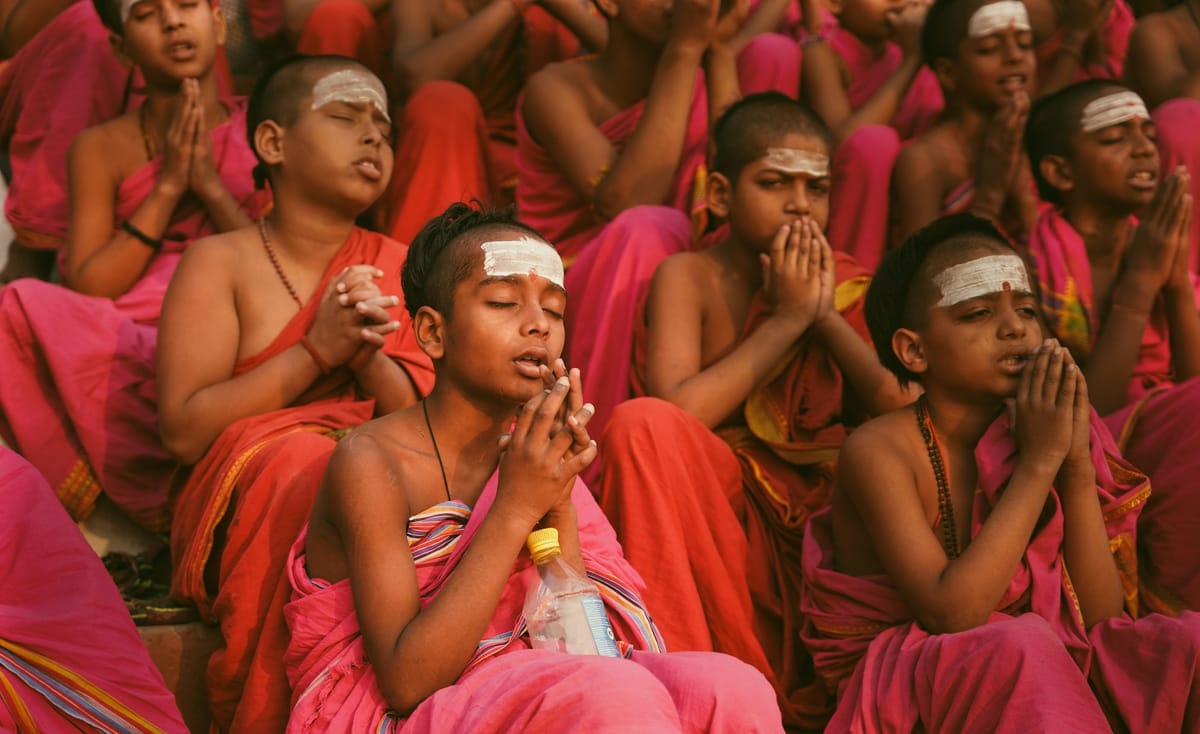The War That Hindus Refuse to Fight

What happens when one civilization says 'we contain multitudes' and another says 'there is only one truth, and it's mine'? The first gets called "tolerant" right up until the moment it refuses to disappear. Then it becomes an obstacle. A problem to be solved.
Hindus look at Christianity, Islam, Judaism, and basically shrug. It's not that Hindus don't care about other religions existing. It's that to them, the very concept of religions being in competition makes as much sense as rivers fighting over who gets to flow downhill.
When Hindus say they are hospitable to differences, they aren't just being polite. They are operating from a position of such profound confidence in their own cosmological framework that they can afford to treat other religions like regional dialects of the same fundamental reality.
Judaism worships one God? Cool, we've got a monotheistic school of thought for that. Islam has submission to divine will? We've been exploring surrender to the absolute for millennia. Christianity discovered love as a path to the divine? Adorable—we wrote the Bhakti texts before Jesus learned carpentry. That's how a Hindu thinks.
Hinduism's "tolerance" isn't weakness but the ultimate flex. It's saying: "Your entire theological revolution is, to us, one more flavor of ice cream at a shop that's been open for millennia."
But here's where it gets ugly. Because Christianity and Islam cannot operate in a universe where they are just one option among many. The entire architecture of their thought is built on the scaffolding of exclusive truth. Not a truth. The truth. And that truth demands something very specific: expansion.
Christianity and Islam were born as a rejection of pagan faiths, so they have no ground to stand on except the ground they claim. And the only way to validate that claim is to spread. To convert.
From the Hindu perspective, this is pathological. Not immoral—pathological.
As in, it betrays a sickness at the core of the theology because the need to convert others reveals a fundamental insecurity. If your truth is self-evident, it doesn't need aggressive marketing and if your god is truly omnipotent, they don't need you to go door-to-door like a spiritual Amway salesman.
The wish to convert is the wish to validate yourself through the destruction of others' frameworks and Hindus find this incomprehensible.
At the same time Hindus will defend Christianity's right to exist and bat for their religious freedom. Because the principle of religious freedom—the idea that different paths can coexist—is baked into the Hindu worldview. But Christianity cannot return the favor.
Because their theological architecture won't allow it. As long as Hindu Dharma exists—as long as a billion people worship in ways that don't acknowledge Christ—Christianity will remain, by its own definition, incomplete. The Kingdom hasn't come. The harvest isn't finished and there are still people left to convert.
Hindu Dharma, from an Abrahamic perspective, is an insult to the true faith. An affront to divine truth. This is why interfaith dialogue always has a tense energy. Hindus show up thinking we're comparing notes about different paths up the same mountain. Abrahamic believers show up thinking they're in enemy territory, surrounded by people who need saving but don't know it yet.
Christianity and Islam's universalism condemns them to perpetual dissatisfaction. Every Hindu who doesn't convert is not just someone who made a different choice—they're a wound in the fabric of reality that needs healing.
So when you hear about religious conflict in India, understand what's actually happening beneath the surface. It's not a war between religions. It's the sound of one religion trying to start a war, and another refusing to show up for it.
Hindus keep saying: "We can coexist. We have room for you. Your truth can be true for you." And the followers of Abrahamic faiths keep responding: "That's not how truth works. My god is the only true god. Either you submit or you're an obstacle."
The tragedy is that one of them doesn't believe conflict is necessary, and the other doesn't believe coexistence is possible. Guess which is which. And guess which one history will remember as "intolerant" when this is all over.





